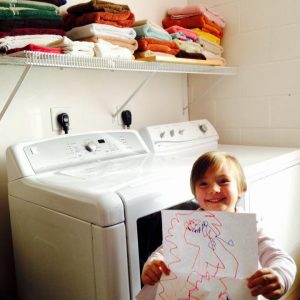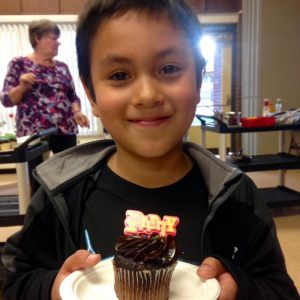CSU freshman Ezekial Arias had an impactful first year on campus: “This year has been astonishing, and I’ve grown as an individual tremendously. I will take the tools and experiences gained through this class service experience and apply them in my daily understanding of life.”
Arias was one of eighteen students in Professor Ashby Butnor’s Key Service cluster this past fall. Key Service is a division of Key Communities that focuses on service learning, one of the ten recognized high-impact teaching and learning practices. Service learning is a teaching strategy that integrates volunteer service with classroom learning to enhance student understanding of course content, social issues, and community needs.
Sam Desta, the Key Service Coordinator, explains the impetus for first-year students to participate in service learning: “For students who participate in the Key Service community, there is a great sense of wanting to give back to the community. Many describe having benefitted from their community and value being able to contribute in some way.”
Butnor finds service learning to be a valuable asset in her applied ethics courses, including the Key Seminar and her Moral and Social Problems classes. She affirms, “It’s one thing to read about ethical issues, but to see how they unfold in the community is something very different. For most students, service learning increases empathy, expands perspectives, and changes their perceptions of their own ability to contribute to the community. These new attitudes typically don’t develop as well when confined to a classroom.”
Annemarie Parker, first-year student and Key Service student-of-the-year, explains the impact of her service: “These volunteer experiences have shown me how to be more empathetic and also open-minded to all people and all types of circumstances. I have made so many connections through this project and have learned a lot about myself and others.”
Butnor has focused her service projects on supporting groups working with neighbors experiencing homelessness. At a meeting with the City of Fort Collins, Butnor realized that much of this work takes place through Fort Collins’ faith-based communities. She teamed up with two local churches—Fort Collins Mennonite Fellowship and Peak Community Church—to support their Warming Centers on Friday and Sunday evenings. Students help make and serve meals, prepare coffee, coordinate shower schedules, and share conversation with the evening’s guests.
 Mya Coca describes her engagement with the Mennonite Fellowship, “I felt excited every weekend to engage with the guests, and it was something I looked forward to. I hoped that I had an impact on one of them in a positive way or perhaps just put a smile on their face and show them that someone cares. I enjoyed serving and investing in the lives of fellow humans in need.”
Mya Coca describes her engagement with the Mennonite Fellowship, “I felt excited every weekend to engage with the guests, and it was something I looked forward to. I hoped that I had an impact on one of them in a positive way or perhaps just put a smile on their face and show them that someone cares. I enjoyed serving and investing in the lives of fellow humans in need.”
Pastor Steve Ramer of the Mennonite Fellowship is very excited about this CSU partnership and comments, “The CSU students have just been incredible. We could not pull off these suppers without their support and hard work.”
Butnor was also introduced to Faith Family Hospitality (FFH), a non profit organization and interfaith collaboration that empowers families to obtain sustainable self-sufficiency. Butnor was impressed by the structure and wrap-around support offered by FFH and chose it as the primary community partner for the new Key Service cluster. In addition to collaborating with local faith communities to house families, FFH provides case management in which individual situations are evaluated, plans for permanent housing are developed, and connections to other local resources (such as Homeward Alliance, One Village One Family, Project Self Sufficiency, and The Matthews House) are facilitated.
 Butnor’s Key Service students served families enrolled with FFH by running their Day Center on Saturdays throughout the fall semester. The Day Center provides a place for families to rest, prepare meals, do laundry, take showers, and access the internet for job and housing opportunities. Students took full responsibility for the Day Center, including opening the center, doing Food Bank runs and preparing lunch, running laundry loads of towels, and, their favorite activity, playing with the children.
Butnor’s Key Service students served families enrolled with FFH by running their Day Center on Saturdays throughout the fall semester. The Day Center provides a place for families to rest, prepare meals, do laundry, take showers, and access the internet for job and housing opportunities. Students took full responsibility for the Day Center, including opening the center, doing Food Bank runs and preparing lunch, running laundry loads of towels, and, their favorite activity, playing with the children.
Chrissa Percival, FFH Program Director, explains the impact of the students’ service, “Even when the Day Center was relatively quiet, I reminded the students that their presence is their most significant service here. Keeping this safe space available for our families is so very valuable. And, I believe this was a truly enjoyable experience for everyone. There were some real connections being made.”
For many students, serving families experiencing homelessness cultivated their sense of compassion and offered them a chance to grow more as individuals. Miguel Ojeda, who plans to pursue service as a career, says, “Volunteering at FFH has taught me and opened up my eyes in ways that words cannot explain. There were many people there who spoke to my heart.”
 Arias elaborates on how he has grown and how his understanding of service developed through the course: “This made me much more empathetic toward the homeless community and individuals. I learned that I cannot place myself on a higher pedestal than them, and I am not entitled to that claim. These individuals are usually going through a rough patch in their life, as we all do, and I serve to help build them up. Along the way, I was assembling my foundation as an individual and realized people benefited me just as I benefited them.”
Arias elaborates on how he has grown and how his understanding of service developed through the course: “This made me much more empathetic toward the homeless community and individuals. I learned that I cannot place myself on a higher pedestal than them, and I am not entitled to that claim. These individuals are usually going through a rough patch in their life, as we all do, and I serve to help build them up. Along the way, I was assembling my foundation as an individual and realized people benefited me just as I benefited them.”
Makayla Harris, a junior who was greatly impacted by the experience and is planning to change majors as a result, explains the value of service learning for college courses, “I would recommend volunteering to anyone. I believe some people only associate people who are homeless with stereotypes. By spending some time with people who are homeless, I believe many of those stereotypes could be broken and there would be a greater willingness to help. I also feel as though we fail to see the homeless as people, people who have basic needs just like everyone else.”
Harris echoes a theme that Butnor hears again and again during end-of-semester reflection activities—service enables students to see for the first time the humanity of individuals experiencing homelessness. Given how significant, powerful, and necessary this realization is, Butnor plans to continue integrating service learning into her courses and helping to foster these needed connections.